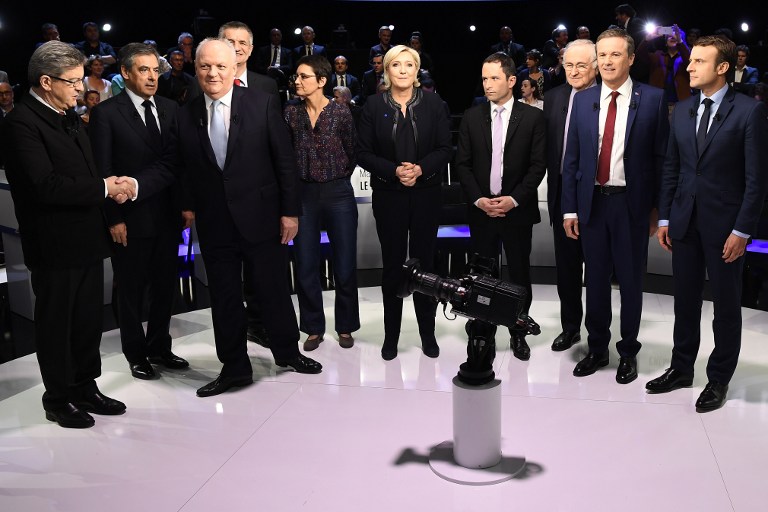Paris – All 11 candidates for the French presidency held a debate on Tuesday night, the first of its kind in the European country.
The four hours of debate, which drew in six million viewers, saw candidates clash over economy and redefining France’s place in Europe. While frontrunners 39-year-old centrist Emmanuel Macrona and 48-year-old far-right leader Marine Le Pen continued to lead the polls, the television debate helped shed light on the six lesser-known candidates.
“I want to recover the optimism of the French,” said Macron, currently tipped to win in May, asserting that entrepreneurs and businesses are job creators. “We must invest to get the machine going again.”
But Le Pen said the answer lies in “economic patriotism”, vowing to fight “out-of-control globalization” with her anti-EU agenda.
Former Prime Minister Francois Fillon, under pressure after being charged with misuse of public funds, said France’s grinding 10 percent unemployment and massive debt combined to create an “explosive situation”.
The 63-year-old conservative said Europe was “veering off course” and that France needs to get it back on track.
Communist-backed Jean-Luc Melenchon, 65, who has been rising in the polls, came out slugging against big business, saying it should “pay back” its riches. For his part Benoit Hamon, who is carrying the Socialist banner as Francois Hollande nears the end of a deeply unpopular presidency, vowed to “demolish” new labor laws seen as too pro-business, and create one million jobs in the next five years.
He took a swipe at Fillon, who has vowed to cut half a million jobs from the country’s bloated civil service.
The presence of the six minor candidates — all polling well under five percent — added a strong anti-capitalist element to the debate, as well as vivid anti-EU sentiment.
“The French understand that the stakes in this election are to reorient Europe” in view of globalization and Britain’s decision to quit the EU, said Nicolas Dupont-Aignan, head of Debout la France (Rise Up France).
Jacques Cheminade, head of the LaRouche movement, railed against what he called the “financial dictatorship” and Philippe Poutou of the New Anti-Capitalist Party slammed “those who stuff themselves”.
Jean Lassalle, speaking in the thick accent of the southwest, said he proposed a “future based on hope” in contrast to high suicide rates in the suburbs of main cities, as well as in rural communities — “that’s the reality”.
Security issues prompted a vigorous discussion as the country is still under state of emergency following deadly attacks in Paris in 2015.
Le Pen wants to reinstate France’s national borders to prevent potential attackers from entering the country.
She pledged to boost the military budget and suggested closing a hundred mosques in the country she describes as preaching a “radical” Islam.
Macron vowed to pursue France’s military operations in Syria, Iraq and Africa’s Sahel region and promised to hire 10,000 police forces to help ensuring security on the country’s territory.
In the crowded debate, each candidate was allowed to speak for around 15 minutes and the questions were restricted to just three themes — how to create jobs, how to protect France, and the thorny issue of how each candidate would implement their vision of France’s social model.
The final result of an election that is being watched closely around the world is still seen as highly unpredictable.
Dissatisfaction and outright hostility towards mainstream politics is high in France and surveys show around a third of voters plan to abstain, while around a third of likely voters say they have still not made up their minds.
Macron, whom the daily Le Parisien on Tuesday dubbed “the man to beat”, has warned that commentators are still underestimating Le Pen.
Those who say she stood no chance in May’s deciding round — between the top two places in the first round on April 23 — are “the same people who said (Donald) Trump couldn’t win”, Macron said.
He is facing the most scrutiny, as he is tipped to clinch final victory in a May 7 run-off against Le Pen.
